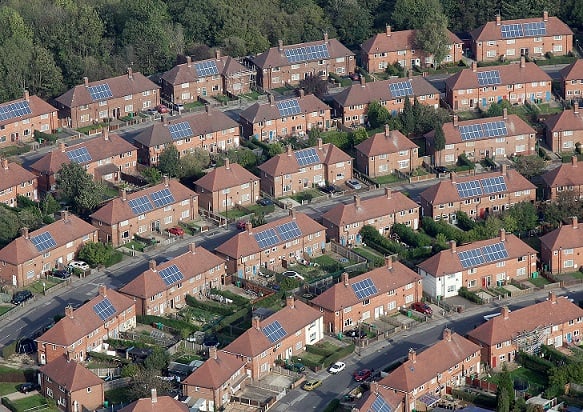
Image: Nottingham City Council.
The Environmental Audit Committee (EAC) is calling for the introduction of a floor price above zero for the Smart Export Guarantee (SEG) to help support community energy.
This follows industry feedback gathered through a call for evidence regarding community energy issued by the EAC in February that saw 57 responses. Industry representatives told the committee that in its current form, the SEG – which came into effect in January 2020 and requires energy suppliers to offer an export tariff – is “flawed because it provides no minimum export price, and no long-term certainty beyond 12-month periods”.
As a result, the EAC is also recommending that the government extends the guarantee on the energy export price. These recommendations have been issued in a letter addressed to energy secretary Kwasi Kwarteng, detailing how while the SEG has replaced the feed-in tariff (FiT), it puts the community energy sector at a disadvantage to larger renewable energy projects which receive long-term certainty from Contracts for Difference.
Indeed, the sector’s feedback included how changes to the subsidies available over the past five years have negatively affected the financial viability of community energy projects, particularly small rooftop solar and urban projects. Prior to its implementation, the SEG – and in particular the policy gap between it and the FiT – faced criticism from across the industry, with the chief ask being the introduction of a minimum floor price for the scheme, most notably from Solar Energy UK (then the Solar Trade Association).
The letter goes on to express the disappointment of the committee that the energy white paper only mentions community energy once and local energy twice, recommending that the forthcoming net zero strategy emphasises the importance of community energy and that the Department for Business, Energy and Industrial Strategy develops a complementary UK-side community energy strategy including practical support measures.
Additionally, community energy and environmental groups, charities and electricity network operators suggested to the EAC that the current regulatory regime for energy distribution acts largely as a barrier for the growth of the sector in the UK. Grid connection costs and access charges can be too high for small groups and do not account for the wider decarbonisation benefits including education and social support that projects bring to their communities, the letter said.
‘Right of local supply’ was also identified as being in need of some work, enabling local energy markets to balance supply and demand at a community level and build energy resilience by harnessing edge-of-the-grid potential in the future.
Currently, the inability of a community project to sell their energy to their own community and accommodate local demand is a significant barrier to project development, according to the evidence gathered by the EAC, which said that while the Local Electricity Bill sought to address this, it will fall at the end of the Parliamentary session.
The government should therefore remove the regulatory barriers to allow community energy projects to sell their energy to their local communities, and Ofgem should also provide guidance to distribution network operators (DNOs) on how to incorporate community energy into the energy network.
EAC chairman, Philip Dunne, said that the committee's continuing inquiry into technological innovations and climate change has shown there is no shortage of innovative ideas but “what is lacking is government support, a coherent plan and recognition of current barriers” with community energy no exception to that.
“For net zero Britain requires us to change our behaviour and adapt to a low-carbon lifestyle. Community energy can help achieve this – not only powering homes and businesses up and down the country but by engaging local citizens on the benefits of renewable energy and – in many ways – how we can do our bit to help keep the lights on ourselves.”

